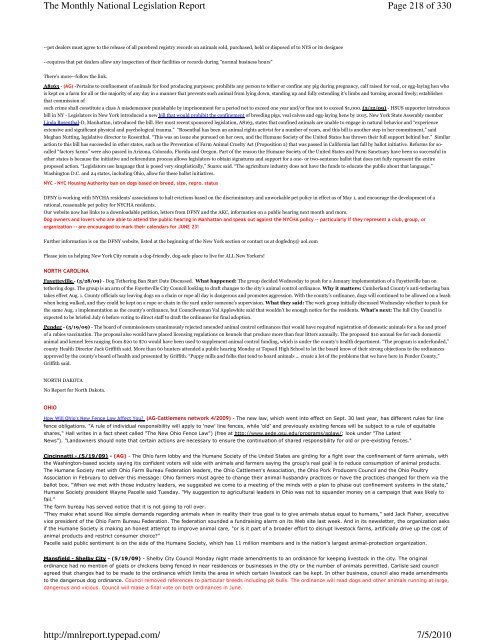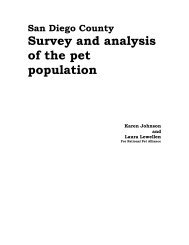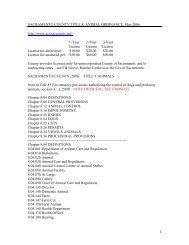<strong>The</strong> <strong>Monthly</strong> <strong>National</strong> <strong>Legislation</strong> <strong>Report</strong>http://mnlreport.typepad.com/<strong>Page</strong> 218 <strong>of</strong> <strong>330</strong>7/5/<strong>2010</strong>--pet dealers must agree to the release <strong>of</strong> all purebred registry records on animals sold, purchased, held or disposed <strong>of</strong> to NYS or its designee--requires that pet dealers allow any inspection <strong>of</strong> their facilities or records during "normal business hours"<strong>The</strong>re's more--follow the link.A8163 - (AG) -Pertains to confinement <strong>of</strong> animals for food producing purposes; prohibits any person to tether or confine any pig during pregnancy, calf raised for veal, or egg-laying hen whois kept on a farm for all or the majority <strong>of</strong> any day in a manner that prevents such animal from lying down, standing up and fully extending it's limbs and turning around freely; establishesthat commission <strong>of</strong>such crime shall constitute a class A misdemeanor punishable by imprisonment for a period not to exceed one year and/or fine not to exceed $1,000. (5/12/09) - HSUS supporter introducesbill in NY - Legislators in New York introduced a new bill that would prohibit the confinement <strong>of</strong> breeding pigs, veal calves and egg-laying hens by 2015. New York State Assembly memberLinda Rosenthal-D, Manhattan, introduced the bill. Her most recent sponsored legislation, A8163, states that confined animals are unable to engage in natural behavior and “experienceextensive and significant physical and psychological trauma.” “Rosenthal has been an animal rights activist for a number <strong>of</strong> years, and this bill is another step in her commitment,” saidMeghan Nutting, legislative director to Rosenthal. “This was an issue she pursued on her own, and the Humane Society <strong>of</strong> the United States has thrown their full support behind her.” Similaraction to this bill has succeeded in other states, such as the Prevention <strong>of</strong> Farm Animal Cruelty Act (Proposition 2) that was passed in California last fall by ballot initiative. Reforms for socalled“factory farms” were also passed in Arizona, Colorado, Florida and Oregon. Part <strong>of</strong> the reason the Humane Society <strong>of</strong> the United States and Farm Sanctuary have been so successful inother states is because the initiative and referendum process allows legislators to obtain signatures and support for a one- or two-sentence ballot that does not fully represent the entireproposed action. “Legislators use language that is posed very simplistically,” Suarez said. “<strong>The</strong> agriculture industry does not have the funds to educate the public about that language.”Washington D.C. and 24 states, including Ohio, allow for these ballot initiatives.NYC - NYC Housing Authority ban on dogs based on breed, size, repro. statusDFNY is working with NYCHA residents' associations to halt evictions based on the discriminatory and unworkable pet policy in effect as <strong>of</strong> May 1, and encourage the development <strong>of</strong> arational, reasonable pet policy for NYCHA residents.Our website now has links to a downloadable petition, letters from DFNY and the AKC, information on a public hearing next month and more.Dog owners and lovers who are able to attend the public hearing in Manhattan and speak out against the NYCHA policy -- particularly if they represent a club, group, ororganization -- are encouraged to mark their calendars for JUNE 23!Further information is on the DFNY website, listed at the beginning <strong>of</strong> the New York section or contact us at dogfedny@ aol.comPlease join us helping New York City remain a dog-friendly, dog-safe place to live for ALL New Yorkers!NORTH CAROLINAFayetteville - (5/28/09) - Dog Tethering Ban Start Date Discussed. What happened: <strong>The</strong> group decided Wednesday to push for a January implementation <strong>of</strong> a Fayetteville ban ontethering dogs. <strong>The</strong> group is an arm <strong>of</strong> the Fayetteville City Council looking to draft changes to the city’s animal control ordinance. Why it matters: Cumberland County’s anti-tethering bantakes effect Aug. 1. County <strong>of</strong>ficials say leaving dogs on a chain or rope all day is dangerous and promotes aggression. With the county’s ordinance, dogs will continued to be allowed on a leashwhen being walked, and they could be kept on a rope or chain in the yard under someone’s supervision. What they said: <strong>The</strong> work group initially discussed Wednesday whether to push forthe same Aug. 1 implementation as the county’s ordinance, but Councilwoman Val Applewhite said that wouldn’t be enough notice for the residents. What’s next: <strong>The</strong> full City Council isexpected to be briefed July 6 before voting to direct staff to draft the ordinance for final adoption.Pender - (5/19/09) - <strong>The</strong> board <strong>of</strong> commissioners unanimously rejected amended animal control ordinances that would have required registration <strong>of</strong> domestic animals for a fee and pro<strong>of</strong><strong>of</strong> a rabies vaccination. <strong>The</strong> proposal also would have placed licensing regulations on kennels that produce more than four litters annually. <strong>The</strong> proposed $10 annual fee for each domesticanimal and kennel fees ranging from $20 to $70 would have been used to supplement animal control funding, which is under the county’s health department. “<strong>The</strong> program is underfunded,”county Health Director Jack Griffith said. More than 60 hunters attended a public hearing Monday at Topsail High School to let the board know <strong>of</strong> their strong objections to the ordinancesapproved by the county’s board <strong>of</strong> health and presented by Griffith. “Puppy mills and folks that tend to hoard animals … create a lot <strong>of</strong> the problems that we have here in Pender County,”Griffith said.NORTH DAKOTANo <strong>Report</strong> for North Dakota.OHIOHow Will Ohio's New Fence Law Affect You? (AG-Cattlemens network 4/2009) - <strong>The</strong> new law, which went into effect on Sept. 30 last year, has different rules for linefence obligations. "A rule <strong>of</strong> individual responsibility will apply to 'new' line fences, while 'old' and previously existing fences will be subject to a rule <strong>of</strong> equitableshares," Hall writes in a fact sheet called "<strong>The</strong> New Ohio Fence Law") (free at http://www.aede.osu.edu/programs/aglaw/; look under "<strong>The</strong> LatestNews"). "Landowners should note that certain actions are necessary to ensure the continuation <strong>of</strong> shared responsibility for old or pre-existing fences."Cincinnatti - (5/19/09) - (AG) - <strong>The</strong> Ohio farm lobby and the Humane Society <strong>of</strong> the United States are girding for a fight over the confinement <strong>of</strong> farm animals, withthe Washington-based society saying itis confident voters will side with animals and farmers saying the group's real goal is to reduce consumption <strong>of</strong> animal products.<strong>The</strong> Humane Society met with Ohio Farm Bureau Federation leaders, the Ohio Cattlemen's Association, the Ohio Pork Producers Council and the Ohio PoultryAssociation in February to deliver this message: Ohio farmers must agree to change their animal husbandry practices or have the practices changed for them via theballot box. "When we met with those industry leaders, we suggested we come to a meeting <strong>of</strong> the minds with a plan to phase out confinement systems in the state,"Humane Society president Wayne Pacelle said Tuesday. "My suggestion to agricultural leaders in Ohio was not to squander money on a campaign that was likely t<strong>of</strong>ail."<strong>The</strong> farm bureau has served notice that it is not going to roll over."<strong>The</strong>y make what sound like simple demands regarding animals when in reality their true goal is to give animals status equal to humans," said Jack Fisher, executivevice president <strong>of</strong> the Ohio Farm Bureau Federation. <strong>The</strong> federation sounded a fundraising alarm on its Web site last week. And in its newsletter, the organization asksif the Humane Society is making an honest attempt to improve animal care, "or is it part <strong>of</strong> a broader effort to disrupt livestock farms, artificially drive up the cost <strong>of</strong>animal products and restrict consumer choice?"Pacelle said public sentiment is on the side <strong>of</strong> the Humane Society, which has 11 million members and is the nation's largest animal-protection organization.Mansfield - Shelby City - (5/19/09) - Shelby City Council Monday night made amendments to an ordinance for keeping livestock in the city. <strong>The</strong> originalordinance had no mention <strong>of</strong> goats or chickens being fenced in near residences or businesses in the city or the number <strong>of</strong> animals permitted. Carlisle said councilagreed that changes had to be made to the ordinance which limits the area in which certain livestock can be kept. In other business, council also made amendmentsto the dangerous dog ordinance. Council removed references to particular breeds including pit bulls. <strong>The</strong> ordinance will read dogs and other animals running at large,dangerous and vicious. Council will make a final vote on both ordinances in June.
<strong>The</strong> <strong>Monthly</strong> <strong>National</strong> <strong>Legislation</strong> <strong>Report</strong>http://mnlreport.typepad.com/<strong>Page</strong> 219 <strong>of</strong> <strong>330</strong>7/5/<strong>2010</strong>Stow - (5/2/09) - While animal care and control services are available through area police departments, Summit County Animal Control, Ohio Department <strong>of</strong> Natural Resources Division <strong>of</strong>Wildlife, and the Humane Society <strong>of</strong> Greater Akron, the first line <strong>of</strong> domestic animal restraint is its keeper's responsibility, said Fatheree. If a Stow resident has a dog at large, there is a $20fine for the first <strong>of</strong>fense, $40 for the second <strong>of</strong>fense, and then police issue a citation for which the fine could be $150 plus court costs, according to Vicki Huff, administrative assistant to StowMayor Karen Fritschel. In Munroe Falls, residents not in compliance with local codified ordinances regarding pet control also pay the price, which could be more than $100 in fines and anappointment with the Munroe Falls Mayor's Court, according to Mayor Frank Larson. According to Stow and Munroe Falls code, all dogs have to be on a leash or need to be contained in thepet owner's yard. For both communities, the code also includes "litter box" legislation, which states that dog owners are responsible to remove canine feces left on any public or privateproperty other than their own. For any animal issue, a call to the police department is a good first step. If additional steps are required beyond police assistance, <strong>of</strong>ficers can determine whataction might need to be taken, according to Young. In instances requiring cat or dog control, including bite cases involving attacks on humans or animals, police will involve Summit CountyAnimal Control. For non-threatening wildlife, residents are responsible for incidents occurring on their property. In those situations, police can refer residents to a trapper, said Young. Formore information or non-emergency animal control issues, call SCAC at <strong>330</strong>-643-2845. To reach SCAC's 24-hour emergency hotline, call <strong>330</strong>-643-2181. For more information from the OhioDepartment <strong>of</strong> Natural Resources Division <strong>of</strong> Wildlife, call <strong>330</strong>-644-2293. To reach the Humane Society <strong>of</strong> Greater Akron, call <strong>330</strong>-657-<strong>2010</strong>.Youngstown - (5/19/09) - <strong>The</strong> top court didn’t say when it would rule on Youngstown’s dog ordinance. That’s part <strong>of</strong> the question the Ohio Supreme Court will have to decide as itconsiders whether a Youngstown city ordinance requiring owners <strong>of</strong> vicious dogs to keep them confined and controlled is unconstitutional. Oral arguments were heard in the case Tuesday inColumbus.OKLAHOMAH1332 - (5/22/09) - No Senate vote for puppy mill bill. Measure dies in committee as session wraps up. <strong>The</strong> bill wasn't able to get enough signatures in the Senate General ConferenceCommittee on Appropriations. Because <strong>of</strong> that it will not be heard any further this session. <strong>The</strong> bill is most likely dead and we understand that,” said lobbyist Stephen W. Eberle <strong>of</strong> theOklahoma Animal Protection Association. According to Eberle, there is still talk <strong>of</strong> the bill coming out <strong>of</strong> committee. “Everyone in Oklahoma knows about puppy mills and understands theSenate and House voted very strongly,” he said. “<strong>The</strong> opposition is clearly the American Kennel Club. <strong>The</strong>y need puppy mills because they license many as certified AKC. A mill producing6,000 dogs a year is far more valuable than a breeder producing a few.” Next time, said Eberle, “<strong>The</strong> bill will be stronger. “We know who the opposition is."Oklahoma City - (5/27/09) - RE: H1332 - <strong>Legislation</strong> that would license animal breeders and impose regulations on their industry failed to win passage in the Legislature this year, but itsauthor said Wednesday the measure remains viable. "It’s still alive,” said Rep. Lee Denney, R-Cushing, a veterinarian who has carried puppy mill legislation the past two years. “We plan tohave it resurrected next session.” But the bill has run into resistance from opponents who claim it is supported by animal rights activists and would not stop the unscrupulous practices <strong>of</strong> dogbreeders it was supposed to target. Some breeders object because it would add state regulations on top <strong>of</strong> existing ones enforced by the U.S. Department <strong>of</strong> Agriculture. “In some respect, Ican’t blame them. <strong>The</strong>y don’t want to be regulated,” Denney said. “That being said, they haven’t been good stewards <strong>of</strong> regulating themselves or we wouldn’t have this problem.” Publichealth is also a concern, she said. Diseases such as E. coli that can be found in substandard dog breeding operations are transmittable to humans, she said. “We can’t have this filth andsqualor in the state <strong>of</strong> Oklahoma,” Denney said.Pittsburg County - (5/23/09) - Pittsburg County commissioners plan to meet in a closed-door secret session during their meeting set for 9 a.m. on Tuesday to discuss taking “disciplinaryaction” against a county employee. <strong>The</strong> way the agenda has been filed is already raising questions. Although the agenda does not state it, one <strong>of</strong> the commissioners has confirmed the subject<strong>of</strong> the secret session involves the Pittsburg County Animal Shelter. A copy <strong>of</strong> the agenda provided to the News-Capital by the commissioners’ <strong>of</strong>fice appears to have already run afoul <strong>of</strong> acouple <strong>of</strong> opinions issued by the Oklahoma Attorney General’s <strong>of</strong>fice and previous case law relating to the state Open Meetings Act.<strong>The</strong> agenda provided to the News-Capital on Friday does not cite the state statute giving the legal justification for the closed-door executive session. It also does not identify — either byname or position — the county employee the commissioners are planning to summon in front <strong>of</strong> them and question during the secret session.Tulsa - (5/2/09) - Economic pressures and tougher scrutiny <strong>of</strong> the industry appear to be causing a decline in the number <strong>of</strong> commercial dog breeders across the country, including inOklahoma, records show. Some puppy dealers seem to be quitting the business, while others are switching over to retail sales, which do not require federal licensing, an <strong>of</strong>ficial said.Oklahoma is among the top five states that are home to thousands <strong>of</strong> breeders and brokers licensed with the U.S. Department <strong>of</strong> Agriculture.Most dog breeders raise expensive, purebred puppies for commercial sale. Since 2006, the number <strong>of</strong> USDA breeders in Oklahoma has declined 26 percent, USDA records show. In October2006, Oklahoma reported 672 breeders, compared with 498 breeders in 2009. <strong>The</strong> number <strong>of</strong> Oklahoma brokers and dealers declined 24 percent, to 44 from 58, in the last three years.Meanwhile, the number <strong>of</strong> breeders nationally declined 15 percent, records show. <strong>The</strong> USDA said the number <strong>of</strong> breeders and brokers can decline in a cyclical manner. A decline could becaused by a variety <strong>of</strong> reasons, including state regulations that address the "retail loophole'' caused by federal regulations. This "retail loophole" allows a person to avoid being registered withthe USDA as long as the person sells directly to the public, typically through advertisements or the Internet, according to a Tulsa World investigation in 2007. "We are seeing some peoplemaking the choice to go out <strong>of</strong> business or go retail due to tougher state laws regulating animal sales," USDA spokeswoman Jessica Milteer said. To view USDA statistics <strong>of</strong> commercialbreeders as <strong>of</strong> 1/2009, click here.OREGONSalem - (5/20/09) - <strong>The</strong> Oregon Senate is to vote next week on a bill strengthening penalties for animal abuse and setting care standards for dogs at mass dog producing facilities. It passedthe House earlier. <strong>The</strong> bill sets a limit <strong>of</strong> 50 breeding dogs at large-scale production facilities, provides humane care requirements and protects consumers who buy dogs with a disease orcongenital defect. <strong>The</strong> bill also requires pet stores to reveal a dog's place <strong>of</strong> origin, health history and registration information. <strong>The</strong> bill will not affect most hobby breeders. Louisiana,Pennsylvania and Virginia passed similar laws in 2008. Legislatures in Indiana and Washington did so this year.PENNSYLVANIACumberland County - (5/22/09) - (AG) - Initially crafted as a mandatory program, USDA backed <strong>of</strong>f and made NAIS enrollment voluntary in 2006 after vocal opposition from farmers.New Agriculture Secretary Tom Vilsack is again ramping up pressure to participate in the system. USDA <strong>of</strong>ficials recently kicked <strong>of</strong>f a nationwide “listening tour” that included a stop inHarrisburg last week. If Thursday’s meeting on the <strong>National</strong> Animal Identification System (NAIS) at the Farm Show Complex was any indication, then finding a solution to thequestion on a workable system is far from over. Dozens <strong>of</strong> passionate and at times angry farmers and industry people showed up for the day-long meeting inside the complex’s large banquetroom. While it was the hope <strong>of</strong> USDA <strong>of</strong>ficials to get some consensus on the program, they instead got an earful from people who feel the agency has lost touch with their concerns and feel itwill overburden them with paperwork and costs. Each person was given three minutes to share their thoughts on the program, including one woman who donned a shirt that read “I love mycountry, it’s the government I’m afraid <strong>of</strong>.”Edgeworth/Sewickley - (5/28/09) - Resident demanding stricter dog ordinances. Council members said they plan to consider updating the ordinances after hearing <strong>of</strong> at least three dogattacks. Edgeworth Council meeting is June 16th.Lancaster - (5/23/09) - Dog wardens have shut down Pendragwn Chow Chow Rescue, a Lancaster dog kennel that was operating without a license. Through the investigation, dog wardensand the Humane League <strong>of</strong> Lancaster County removed 90 dogs from the premises. Jessie Smith, the state's special deputy for dog law, said any kennel with more than 26 dogs per year mustobtain a license and be inspected annually. "Unlicensed kennels are difficult to regulate, and in an animal hoarding situation, it is even more difficult," said Smith. "Animal hoarders are <strong>of</strong>tenin denial about their situation and the conditions in which the animals are forced to live." Smith said animal hoarding is a disorder that causes people to keep large numbers <strong>of</strong> animals intheir home without proper care. Smith said the case highlights important legal advances provided under the new dog law, Act 119 <strong>of</strong> 2008 that Governor Edward G. Rendell signed into law inOctober.Reading - (5/28/09) - Some city pet and animal owners don't like the way the Reading Animal Control Board's proposed animal control ordinance is shaping up. About a half dozen people




